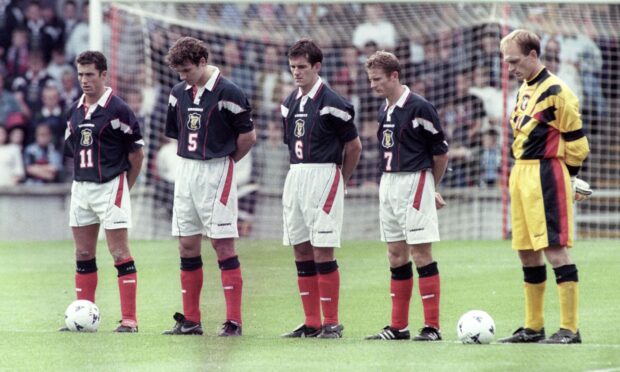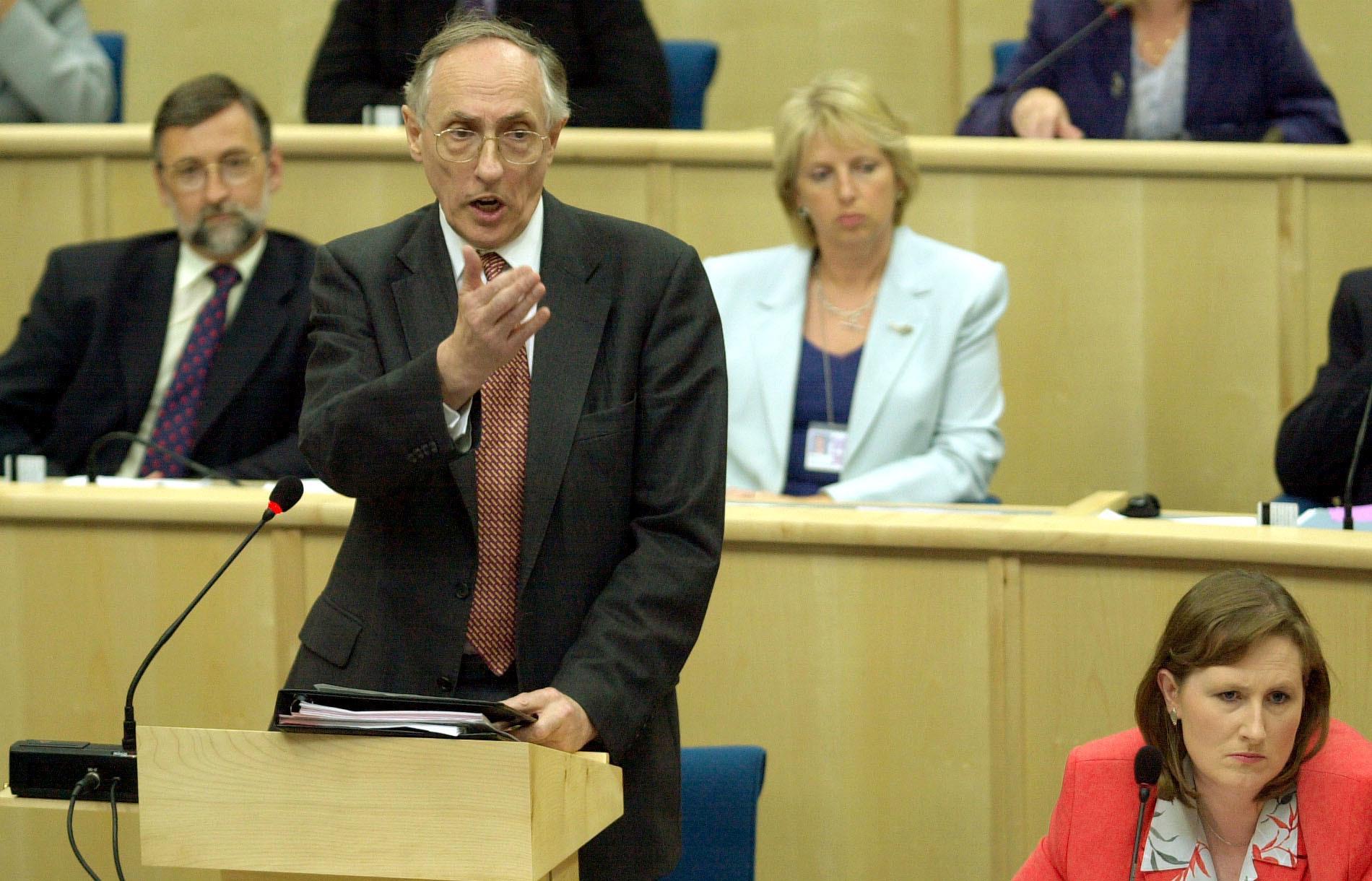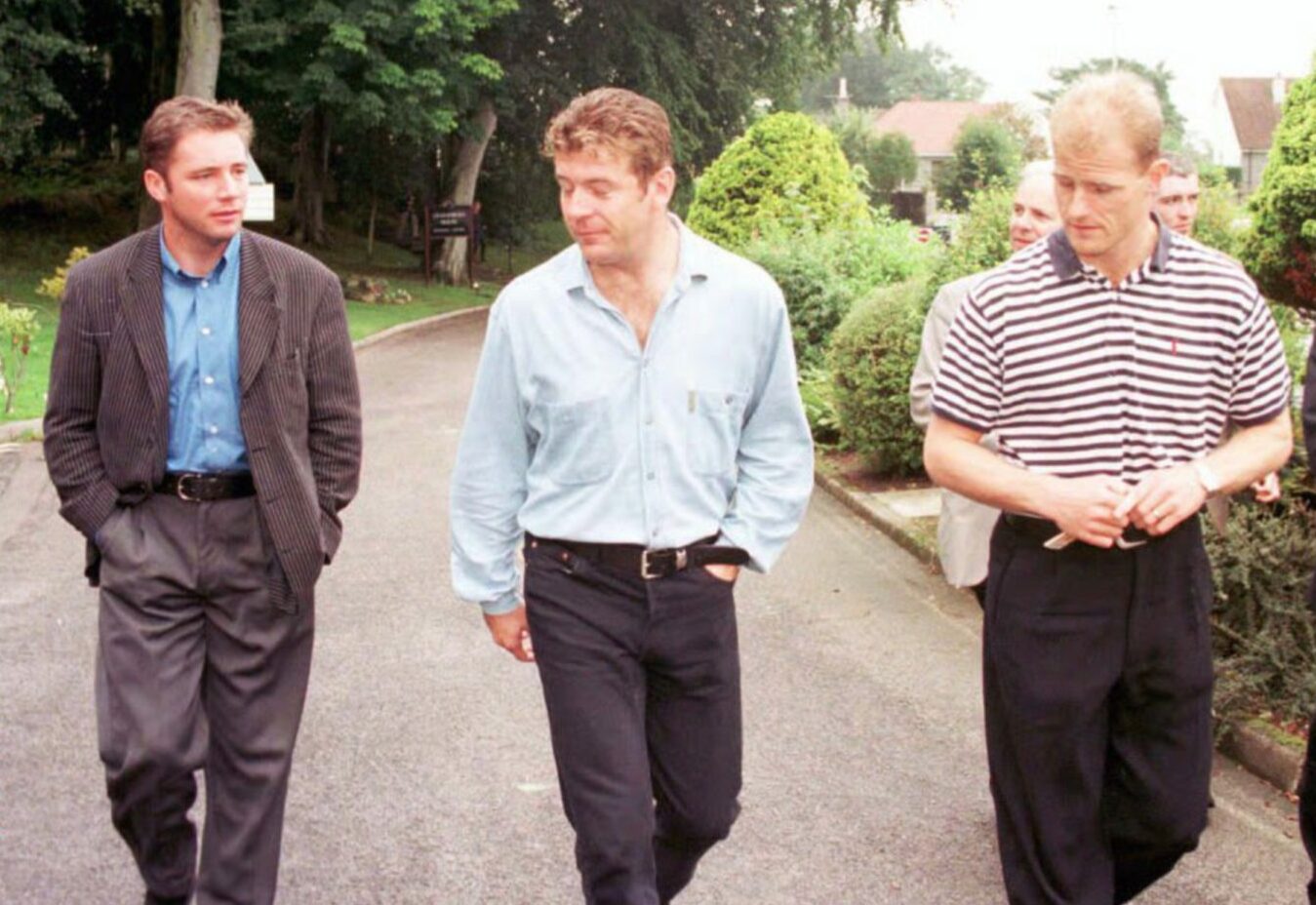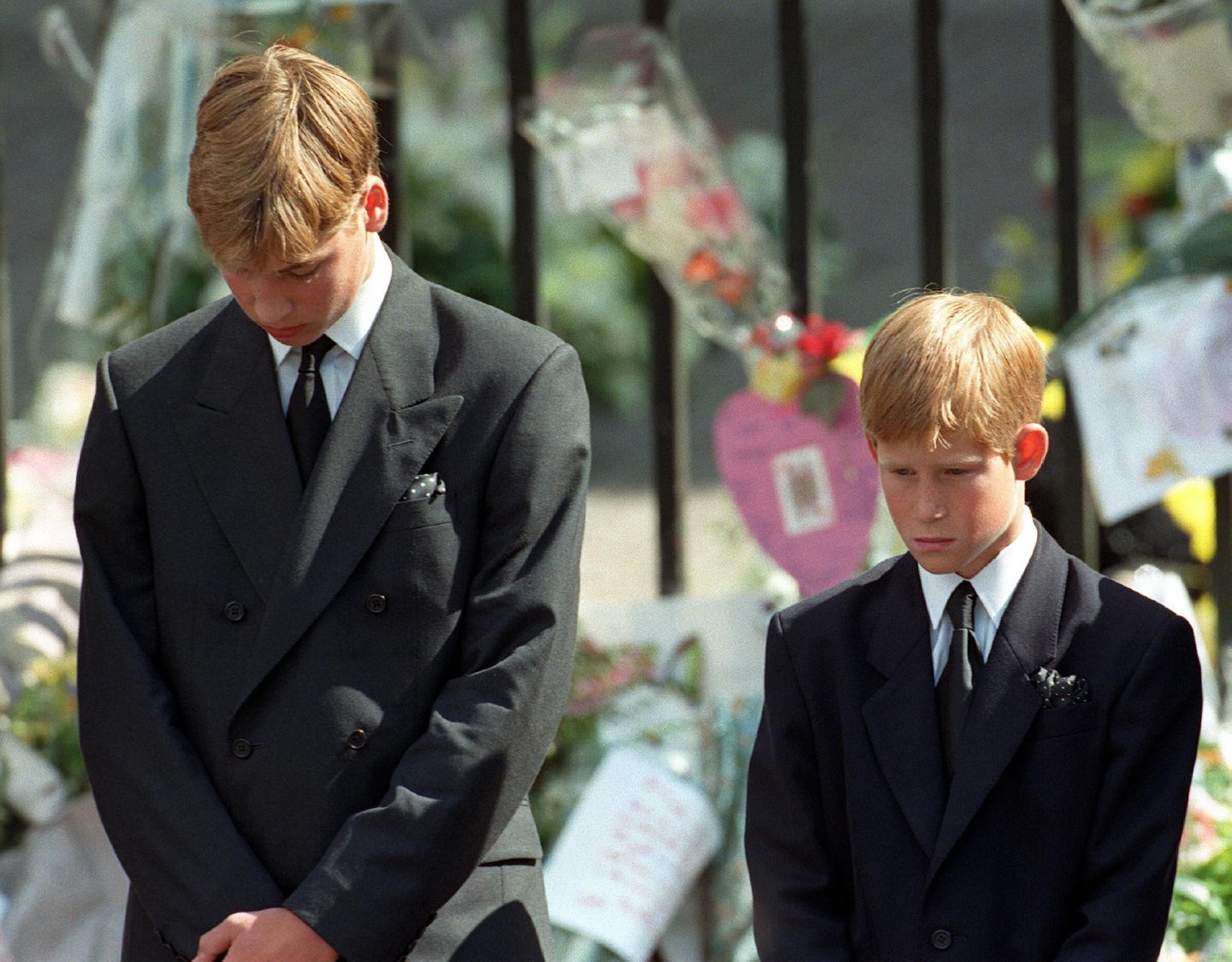It was a political football which almost spiralled out of control 25 years ago; the fury which erupted when the SFA went ahead with plans for a World Cup qualifying match on the same day as Princess Diana’s funeral.
Nobody could have foreseen the level of outrage, nor the vitriol and venom which followed the governing body’s decision to proceed with their World Cup qualifying match against Belarus at Pittodrie on September 6 1997, less than a week after the tragedy in Paris involving the princess and her pursuit by the paparazzi.
But there again, the scenes of mass hysteria which followed her death on August 31 were unprecedented and sparked the cancellation of myriad sporting fixtures throughout Britain. And Scotland was gearing up for a referendum on September 11 on whether to vote for devolution and the creation of its own parliament.
Throw into the mix the autocratic pantomime villain, SFA chief executive Jim Farry, who never knowingly undersold his abilities, invite Rangers stalwart, prominent advocate, anti-devolution campaigner and another unshrinking violet Donald Findlay to join the party, light the blue touch paper….and await a stramash which went all the way to Westminster and dominated the news schedules for the best part of a week.
Buckingham Palace announced on September 1 that Diana’s funeral would take place on the Saturday, the same day on which the Scots were scheduled to meet Belarus, but a morning funeral seemed to offer no direct clash with an afternoon game.
Or not at first. Andy Mitchell, who had just taken on the role of the SFA’s new press officer, suddenly found himself embroiled in a situation which was akin to a bad night at the Borgias. There were no red flags raised when first FIFA, then the Sports Policy Unit at the Scottish Office and, finally, the Lord Chamberlain’s Office at the Palace, reached the same verdict. Namely, that life goes on and, appalling as the circumstances of Diana’s demise had been, all the necessary protocols had been followed.
Farry whipped up a maddened crowd
By early afternoon on September 2, a fax was sent from the SFA’s offices in Park Gardens in Glasgow to the Belarus FA, confirming that the match would go ahead as planned, and this was subsequently confirmed to the Press Association at about 2pm.
As Mitchell recalls: “All hell broke loose. It was the cue for a nationwide outbreak of moral outrage directed at the SFA, and more precisely the person of Jim Farry, for daring to sully the day of mourning.
“Having tried to play by the rules, a decision taken for logical and administratively sound reasons was portrayed as a treasonable offence. The faxes and phone calls poured in. Suddenly and unexpectedly, the SFA was under siege.
“The SFA lost control of events shortly after 9pm when Donald Findlay QC, appeared on the BBC network news to denounce the SFA, and Farry in particular.
“Findlay may have been asked to give his opinion on a football matter, but he was not just a football man, he was also a leader of the Think Twice movement which opposed the setting up of the [Scottish] parliament. Even though a halt had been called to referendum campaigning that week because of the tragedy, he seized the opportunity to point out: “This is what happens when Scots try to run their own affairs!”
In the next few hours, pandemonium reigned as Donald Dewar, the Secretary of State for Scotland, phoned Farry to express his “great concern” about the fixture going ahead as planned. He was swiftly joined by new Labour PM Tony Blair and Opposition leader William Hague in urging cancellation while sections of the media leapt into the fray.
The decision was branded, in various papers and editorials, a “disgrace”, a “scandal”, “an insult to Princess Diana’s memory” and “an affront to the nation”.
Farry, who considered himself a match for every journalist or politician who has ever lived, exacerbated matters by making a joke of Dewar’s call with his response: “Colin Hendry’s out of the game and big Donald might be a valuable addition to the back four.”
This was hardly smart and the backlash soon grew bigger.
Even at a distance, the speed with which the crisis built up momentum was like one of those scenes of an avalanche landing on Wile E Coyote’s head in a Loony Tunes cartoon.
Rangers players decided to pull out
As the week progressed, former and current internationalists were entering the fray – and threatening to exit the squad. Denis Law, the Aberdeen-born Manchester United maestro was among those who condemned the association’s behaviour in these terms: “I would ask not be to be selected if the game was going ahead. The whole nation will be joined in mourning and showing their respect. The SFA have got to have a rethink.’
Then the Rangers players in the squad – Ally McCoist, Gordon Durie and the late Andy Goram – told Craig Brown they would not participate on the Saturday at any time.
A compromise was pursued, with Friday being dismissed perfunctorily, as the prelude to the Belarussians, who had another World Cup qualifier to play against Austria on the following Wednesday, telling the SFA that Sunday was not a possibility either.
Mitchell said: “There were other significant practical considerations: the host club [Aberdeen FC], Grampian police, the referees, the catering and stewarding, and not least the 20,000 supporters who had bought tickets and made travel arrangements.
“Throughout Wednesday, the SFA international committee made efforts to resolve the crisis, meeting at Park Gardens behind closed doors. It proved such an intractable problem that SFA president Jack McGinn revealed that they had even considered withdrawing Scotland from the World Cup altogether.
“The breakthrough finally came when the Belarus FA agreed to accept Sunday, but only after the SFA undertook to cover the additional £25,000 costs of their charter aircraft and hotel accommodation for Saturday night. Finding sufficient bed space in Aberdeen during a major oil conference was just another of many local difficulties”.
But at least, the tie was going ahead, even if that didn’t stop Farry from being portrayed in the red-tops as a lethal combination of Hannibal Lecter and The Grim Reaper.
I still remember having dealings with Farry and he could be puffed-up and pompous in swatting away what he regarded as stupid questions. (All of them). But, whatever his foibles, he didn’t deserve the ferryload of manure which was shovelled his way.
On September 4, the Daily Record’s headline advice to Jim Farry was “Go Now”, while the Scottish Sun splashed with “Off – and so should you be”.
The public, meanwhile, treated the SFA headquarters like their own private dart board.
The abuse thrown at Farry was unrelenting
Mitchell recalled: “The calls flooded in, and to keep the lines operating they were spread throughout the office to anyone available. Many came my way, and there was little I could do except acknowledge the callers’ bitterness, much of it personal against Farry.
“I remember one call particularly, where the man on the phone backed up his complaint by asserting: ‘He’s no oil painting, is he?’ as if Diana’s beauty had been defiled by him”.
On the evening before the funeral, Scotland’s under-21s were beaten 3-0 by their Belarussian counterparts at McDiarmid Park in Perth, but at least football was being talked about rather than affairs of state or political rabble-rousing.
From my own memory, the next morning’s ceremony at Westminster Abbey was an understandably sombre business, with two sons, William and Harry, deprived of their mother.
But there was also a sense that the lachrymose outpouring of grief had lasted long enough for the loss of somebody whom 99.99% of the mourners had never met.
And, by the afternoon, life did return to normal for the vast majority of Scots, including the Tartan Army foot-soldiers who journeyed to the Granite City for the delayed match.
Just a few moments before 2pm on Sunday, September 7, a lone piper stood in the middle of Pittodrie and played the poignant lament, Flowers of the Forest.
The silence was impeccably observed during his performance (which was Farry’s idea), but the supporters soon had plenty to cheer about when the action commenced.
The Scots, ranked 26 in the world, an imposing 77 places above their opponents, seized an early lead through Kevin Gallacher, who doubled his tally after 58 minutes. And there was also a brace for David Hopkin as the hosts cruised to a 4-1 victory with Belarus’ only joy coming from a Pyotr Kachura penalty kick.
In the next few months, they booked their passage to the 1998 World Cup and gained the thrill of an opening match against Brazil in the Stade de France.
But Farry’s days at the helm were numbered.
Mitchell has mixed views about his baptism of fire and brimstone as the press hounded him for every twist in the tale as it unfolded.
On the one hand, he was convinced Farry had been made the scapegoat by certain individuals who were perfectly happy to dig for dirt about Diana while she was alive. Yet, on the other, the chief executive was an all-too-willing accomplice in his own downfall and, two years later, he was out of a job.
Mitchell said: “He could have handled it much better, displaying not just a lack of sensitivity, but an inability to read the public mood until it was too late.”
It would actually make quite a decent TV drama!
More like this:
Princess Diana’s links to the north-east of Scotland emerged after her death in 1997




